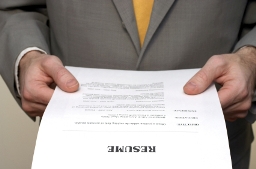![]()
How would an increase in minimum wage affect jobs and hiring? The debate has been circulating for a while over whether a higher minimum wage will cause more people to accept the current job openings or whether those jobs will be eliminated by companies due to the increase in cost to their business. Let us know what you think by voting in our poll.

Have you ever wondered what goes through the hiring manager’s mind when you’re in an interview? Wouldn’t it be nice to know what they were thinking, what they want to hear from you, or what they want to see on your resume? We asked a few hiring managers to share their insight on interview musts and they shared these top four interview tips.
Have Professionalism
The employer you’re interviewing with has goals to grow and brand a company. It’s important to understand that how you present yourself in your personal life may not match the image of the organization, so remember to put your best foot forward. Dress appropriately for the job for which you are interviewing. If you’re not sure, it’s a good idea to ask the interviewer about the dress code. Additionally, there is so much more to professionalism than just dressing the part. Integrity and a good work ethic are also very important attributes to possess and can take you a long way in the hiring process. So make sure you can show these attributes to your interviewer and be ready to share good examples of those traits.
Have a Typo-Free Resume
Job seekers often trust their own eyes to proof and edit their resumes. If no one else reviews your resume, there could be typos that you missed. Find a friend who is great at spelling and grammar or someone that you respect professionally to review and critique your resume before your job hunt, and especially before an interview. If the interview process boils down to three people with the same qualifications and your resume is the only one with a typo, you’re making it easy for an interviewer to choose another candidate.
Have Interest in the Job and the Company
Jennifer Anderson, the hiring manager and vice president of Marketing and Communications at Express Employment Professionals, said, “Often I ask a job seeker to describe to me the ideal job and more times than not the answers come back with something completely unrelated to the job they are seeking. For example, someone may interview for a Marketing Coordinator’s position, but when they describe the ideal job, they want to be a stay at home mother and work from a home office.” So it’s important for the interviewee to understand not only the qualifications of the job they are applying for but also what it is they really want to do with their life and career.
Have a Commitment for More than One Year
Longevity is one of the top qualities employers look for in new hires. Most employers will spend the first six to nine months training you to do a job. Not only will they have invested their time and shared their knowledge, the company has been paying you a salary during your training period. Do your best to learn all you can during training and commit to making the most of your job for a couple of years. Anderson encourages people to let the interviewer know that you’re reliable, you’ll give it your best, and you plan on sticking with the company to help it grow.
After job searching for what seemed like forever, editing your resume, and applying at numerous businesses, it’s time to prepare for an interview. What are some interview tips you’d like to share with us? Let us know in the comments section below.
 In a recent poll we asked why you left your last job or why you’re planning to quit. The results show 34% of respondents want better compensation, while 13% said they didn’t get along with their supervisor. Another 13% had ethical differences with the company, and 10% just didn’t like their job. Only 7% of respondents needed a different schedule, 3% didn’t get along with co-workers, and just 3% said they haven’t ever left their job.
In a recent poll we asked why you left your last job or why you’re planning to quit. The results show 34% of respondents want better compensation, while 13% said they didn’t get along with their supervisor. Another 13% had ethical differences with the company, and 10% just didn’t like their job. Only 7% of respondents needed a different schedule, 3% didn’t get along with co-workers, and just 3% said they haven’t ever left their job.
Looking over this summary of our poll results leads to the question, how can employees fix these issues? Is leaving a job the only answer? It’s understandable that not everyone will get along, and at some point people will decide to leave their job because they just don’t fit in. Maybe, they don’t have the right skills, or the schedule has changed and become challenging, but is there more that can be done instead of just moving on?
Talk to Your Supervisor
Even though you may not get along with the people in charge, before you quit, or if you’ve even thought about quitting, talk to your supervisor. Let that person in leadership know what’s going on. If you don’t like the job you’re doing let them know; they may have a new task they need you to work on. If you don’t get along with someone in the team you’re working with, let your supervisor know. There may be a different project you could work on that could totally change your outlook on your job and brighten your mood. There could be a promotion right around the corner, so keep working hard and doing your best.
Things at work may not always be wonderful, but don’t give up at the first sign of difficulty. Have you stayed at a job even though you haven’t always liked it? What did you learn in that process? Let us know in the comments section below.
 Do you have aspirations of getting a better job or growing your career? Watching the Olympics could help. Every time the Olympic Games roll around, I enjoy watching different athletes from across the world compete, and I anticipate seeing my favorite athletes win gold. This year, that was not the case for one of my favorite sports to watch: snowboarding. But instead of turning off the TV as soon as I realized my favorite snowboarder and two-time gold medalist, Shaun White, wasn’t going to place, I decided to stay tuned in to see who won. Here are some of the lessons I learned.
Do you have aspirations of getting a better job or growing your career? Watching the Olympics could help. Every time the Olympic Games roll around, I enjoy watching different athletes from across the world compete, and I anticipate seeing my favorite athletes win gold. This year, that was not the case for one of my favorite sports to watch: snowboarding. But instead of turning off the TV as soon as I realized my favorite snowboarder and two-time gold medalist, Shaun White, wasn’t going to place, I decided to stay tuned in to see who won. Here are some of the lessons I learned.
Get Back Up and Don’t Give Up
It’s a tough fact of life to learn; you don’t always win, no matter how hard you try or how far in advance you prepare. That fact was made evident during the final halfpipe competition in Sochi. While watching the Olympics, I was reminded that no matter how much a professional athlete prepares, they may not win, but that doesn’t mean they give up. Soon after the halfpipe competition was over, Shaun was interviewed and asked what happened. Instead of blaming it on the snow or the conditions, he said he’d be back next time and he was happy for the guys who did well! What a great attitude to have! We can learn so much from that statement itself. Just because you haven’t landed a job or moved up in your company as fast as you’d like, it doesn’t mean you need to give up or stop trying. The agony of defeat is never easy to handle, but getting back up, working hard, and trying again will help improve your skills and chances of getting that new job or promotion you’ve been looking for.
Learn from Your Mistakes
Unfortunately, making mistakes is a normal part of life. Failure even happens to the best of the best. What’s important to learn from Olympic winners and even those who won’t be taking home a medal is that these athletes don’t let mistakes defeat them. In fact, you’ll probably see many of the same athletes in four years at the next Winter Olympics. It’s important to learn from your mistakes, make the corrections that are needed, and use those lessons to help shape your future. If you’ve been looking for a new job for a while or if you’re ready to go to the next level in your current job, take a look back at what has been slowing you down in the past or getting you off track and work to take care of those mistakes so you won’t drag that baggage with you to the next level. Also, seek feedback from co-workers or friends and make necessary changes.
What are some lessons you’ve learned from the Olympics? Share with us in the comments section below!
 Chances are if you wrote out your 2014 resolutions, “cut down,” “trim,” or “shape up” appeared somewhere, in some form or another on your list. Most people apply those words and phrases to bodily health, but they are also great concepts you should be applying to your resume this year! With the high number of resumes hiring managers receive every day, it’s vital to your job search that you shape up your resume so you’ll get more than just a first glance.
Chances are if you wrote out your 2014 resolutions, “cut down,” “trim,” or “shape up” appeared somewhere, in some form or another on your list. Most people apply those words and phrases to bodily health, but they are also great concepts you should be applying to your resume this year! With the high number of resumes hiring managers receive every day, it’s vital to your job search that you shape up your resume so you’ll get more than just a first glance.
Less is usually more, and in the realm of resumes you want less fluff and more differentiating information. As stated in a Forbes article, “Every word—yes, every word—on that page should be working hard to highlight your talents and skills. If it’s not, it shouldn’t be on there.” So, trim the sugar-coating off your resume and consider these tips.
Slim Down
If the average hiring manager looks at a resume for a minute before deciding whether to keep it or discard it, then you want yours to be as pleasing to the eye as possible. While this involves using the proper layout, font, and text size, it also means you need to keep it focused and cut out unnecessary parts. Yahoo Small Business recommends deleting such areas as the career objective, previous salaries, and that famous final line “References available upon request.” The article also pointed out that “a general rule of thumb is to include employment history dating back 10 years. If you have anything relevant to include beyond this, you can list it under “additional experience,” but only include the company, years, and job title.
Tone Up
Your resume should convey the maximum amount of relevant information in the most compact way possible. That means you need to tighten up your language and avoid certain words. “The average resume is chock-full of sorely outdated, essentially meaningless phrases that take up valuable space on the page,” as detailed in the Forbes article. “Eliminate them, and you’ll come off as a better, more substantial candidate.” Some of the top phrases to cut include experienced, team-player, people-person, energetic, seasoned, well-versed, and dynamic.
Be Flexible
Even once you’ve done all this cutting out and trimming up of your resume, your work still isn’t finished. Every time you apply for a different job, you need to tweak and sculpt your resume to fit the position and company. Highlighting your skills and experiences that align with what the employer is looking for is how you will stand out from the crowd. You’re not changing your work history or misrepresenting yourself – you’re simply showing how things you’ve done in the past relate to this particular job opportunity.
Last year, the American Psychological Association named millenials the most stressed generation. In a study commissioned by the association, nearly 40% of Gen Y said their stress levels had increased over the previous year. Nearly 44% reported feeling irritable or angry because of that stress and 19% had been told they suffered with depression.
So what’s causing all that stress? 76% of millenials said their work was a significant stressor. Which all begs the questions, are we really going about the pursuit of happiness the right way?
Harvard graduate and CEO of Good Think, Inc., Shawn Achor, has been studying positive psychology and the effects of happiness. His consulting firm, Good Think Inc., researches positive outliers – people who are well above average – to understand where human potential, success, and happiness intersect.
Your Pursuit of Happiness
Over the past few years Achor’s research has shown most companies and schools follow the philosophy that “if I work harder, I’ll be successful and if I’m more successful then I’ll be happier.” Shawn argues that it’s the other way around. If you’re happy, you’ll be more successful because the way you view the world actually shapes your reality.
During a TED Talks presentation, Shawn explained that 90% of your long-term happiness is not predicted by the external world but by the way your brain processes the world. He challenges people to raise their level of positivity, and in turn your brain will experience a “happiness advantage”. ‘Your brain at positive performs significantly better than it does at negative, neutral, or stressed” Shawn said. He goes on to explain that not only does your intelligence, creativity, and energy levels rise, but every positive business outcome improves from experiencing better productivity to better sales and job security.
Train Your Brain for Happiness
Shawn’s research shows that there are ways to train your brain to become more positive to improve your potential and become more successful. And the great news is that it only takes two minutes over 21 days in a row to rewire a brain to become more positive and optimistic.
Here are five things Shawn says you can do to train your brain for happiness:
1. Write down three things you’re grateful for
Why? Your brain will learn to scan the world for the positives and not the negatives.
2. Journal about a positive experience
Why? It lets your brain relive it.
3. Exercise
Why ? It teaches your brain that your behavior matters.
4. Meditate
Why? Helps your brain to focus.
5. Perform random acts of kindness
Why? Helps create “ripples of positivity.”
For more information and steps to leveraging happiness in your career, life, and job search, check out Achor’s TED Talk presentation or his recently released book, The Happiness Advantage.
Not only does happiness and positive thinking have the ability to impact your emotions, stress level, and immunity, it can also make a difference in your overall well-being. Let us know how thinking positively benefits you, share with us in the comments section below.
 When it comes to dressing for an interview, conservative is always the best way to go. With today’s ever-changing trends, it’s important to wear proper attire and appropriate colors to allow your interviewer to see you in a good light. Making a positive first impression is vital to getting the job you’ve been waiting for, so keep your attire simple.
When it comes to dressing for an interview, conservative is always the best way to go. With today’s ever-changing trends, it’s important to wear proper attire and appropriate colors to allow your interviewer to see you in a good light. Making a positive first impression is vital to getting the job you’ve been waiting for, so keep your attire simple.
What do the colors you wear say about you? Harris Interactive, one of the world’s leading market research firms, recently performed a national study with 2,099 hiring managers and human resource professionals from various industries and company sizes. These professionals were asked to advise job seekers on the best colors to wear to an interview and here are their recommendations provide valuable insight for job seekers.
Dress for Interview Success
Responses show the most recommended colors to wear to an interview are black or blue because these colors show leadership and professionalism. You don’t have to stick to a plain color of blouse and it’s okay to wear small prints, but keep in mind you don’t want the interviewer to be distracted by your wardrobe.
What Not to Wear
Bright orange topped the charts for being the worst color to wear to an interview, because it is the color that is mostly associated with unprofessionalism.
On the other hand, gray portrays a logical and analytical attitude. White shows organization, brown shows dependability, red shows power, and green, yellow, and purple show a creative side.
CareerBuilder offers these tips on dressing for success when preparing your interview wardrobe:
Don’t ever go to an interview too casual, be sure to dress for the environment, and always look polished. Before your interview, do your research on businesses that are interviewing you so you’ll know what their environments are like. For instance, you wouldn’t want to wear shorts and flip flops to a strictly professional business and you wouldn’t want to interview in slacks and a dress coat at a business that is laid back and less professional or you may not come across as the right fit for the job.
Have you been job searching and recently been asked to come in for an interview? Keep these interview wardrobe tips in mind as you’re preparing for your next job interview.
For more advice on interview wardrobes check out these blogs:
Men’s Work Attire That Never Goes Out of Style
Women’s Work Attire That Never Goes Out of Style
Dress For Success: What to Wear for an Interview
Putting Together a Work Wardrobe
